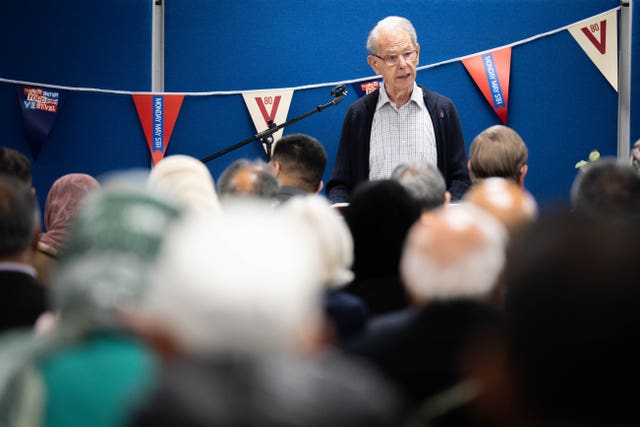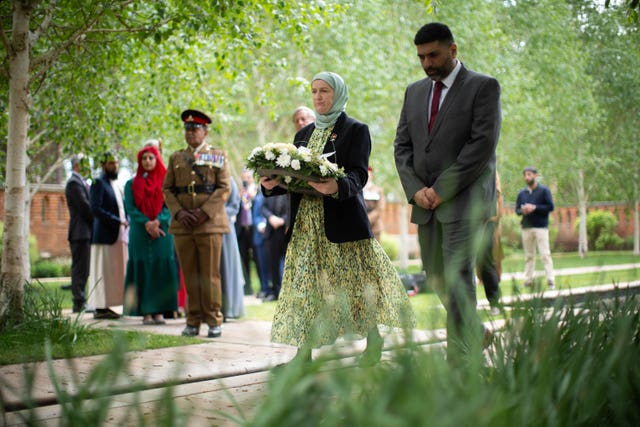Holocaust survivor attends interfaith VE Day celebration at UK’s oldest mosque
John Hajdu, 88, said it was ‘absolutely vital’ that future generations remember the Holocaust as he attended the interfaith VE Day gathering.

A Holocaust survivor who attended an interfaith VE Day anniversary celebration at the UK’s oldest mosque has said it is “absolutely vital” that future generations remember the past.
The event, which also honoured the 1.5 million Muslim fighters who lost their lives during the Second World War, took place at the Shah Jahan Mosque in Woking, Surrey – the oldest purpose-built mosque in the UK and northern Europe.
John Hajdu, 88, attended the gathering on Sunday to give a speech about his story of survival as a Jewish child in Hungary under Nazi rule.
Mr Hajdu, who now lives in Muswell Hill in north London, told the PA news agency: “I was invited to come because it’s an interfaith event and I give talks to schools and universities and adults, and quite often to Muslim schools or Catholic schools.
“It’s absolutely vital that we all together understand what happened and we all remember what happened and we talk to each other, and then pass the message on to our children and grandchildren.”

Mr Hajdu was born in Budapest in April 1937 to a middle class Jewish family which he described as “not particularly religious”.
He was only four years old when Hungary entered the war allied to Nazi Germany in 1941.
Two years later, his father was taken to a forced labour camp for Jewish men.
Mr Hajdu said: “It’s only once the restrictions started, and my father had to go into the forced labour camp, that the first signs were that things are going to get much worse.
“We had to take food for my father, who was very badly treated.
“And then my mother had to look after me and the flat on our own.”
On April 5 1944 an order was made for all Jews to wear a yellow star as a mark of identification, and by June, Mr Hajdu and his mother were forced to move into a designated “yellow star” house.
Mr Hajdu said: “A yellow star house had a yellow star on the front gate, and we had to wear a yellow star.
“And we’re only allowed out of the block between two and five in the afternoon, which meant that that was the only time we could go out and buy some food – abused on the way by the Nazis’ the Arrow Cross party, and you had to be careful where you went, because you could have been beaten or even killed.”
In October 1944, as members of the Arrow Cross Party began rounding up Jewish women and children from the Budapest yellow houses, Mr Hajdu’s aunt Iby ran away with him and “begged” a non-Jewish neighbour to hide them.
Mr Hajdu said: “It was the most unbelievable situation. It was terrifying.
“He agreed that we should hide in the cupboard, and we were fortunate enough not to be discovered.
“But if we would have been discovered, we would have been, without any doubt, shot – including the non-Jewish neighbour.”
Mr Hajdu said his aunt’s action that day “unquestionably” saved his life, while his mother was taken and later marched to the Mauthausen concentration camp in Austria.
Mr Hajdu and his aunt were soon forced to move into Budapest’s Jewish ghetto.
He told PA: “The ghetto was 290 buildings with 15 to 20 of us in each flat, in an area which was only for Jews.
“All the non-Jews were moved out, and this was in an area surrounded by a wall and four gates guarded by the Arrow Cross.
“We only had horse meat and drippings and water had to be brought up from the streets, you didn’t want to go out, because if you went out, you could have been certainly beaten or shot by the Arrow Cross Party.
“People were dying on the street. I was always very hungry.”
On January 17 1945, the Soviet troops surrounded and liberated the Budapest ghetto, allowing Mr Hajdu and his aunt to get out.
He said: “That’s when we found out that the ghetto was mined by the Nazis to be blown up but they didn’t have enough time, fortunately, because of the quick advance of the Russian army.
“And so we were saved again.”

Mr Hajdu later learned his mother “miraculously” survived the Mauthausen concentration camp and was liberated by American soldiers in May 1945.
His father had also managed to escape the forced labour camp but, having thought his wife dead, had moved to Romania where he had started a new relationship with a local woman.
Mr Hajdu and his mother fled Hungary after the war, and arrived in the UK in February 1957 where they settled in London.
Asked what message he would like to pass on to future generations, Mr Hajdu said: “The message is: you must teach.
“Those who are survivors must take every opportunity to talk about what happened to us, to teach the current generation about what happened, to ask them to pass the message on, and the message is that what happened to us must never be forgotten.”
The VE Day event also saw Lord Khan lay a wreath of flowers at the memorial within Woking’s Peace Garden – where 19 Muslim soldiers from the Great War and eight Muslim soldiers from the Second World War are buried.
The ceremony was attended by the Shah Jahan Mosque’s Imam Hafiz Hashmi, the Bishop of Guildford Andrew John Watson, and Rabbi Alex Goldberg, who is the Dean of Religious Life at the University of Surrey in Guildford.





